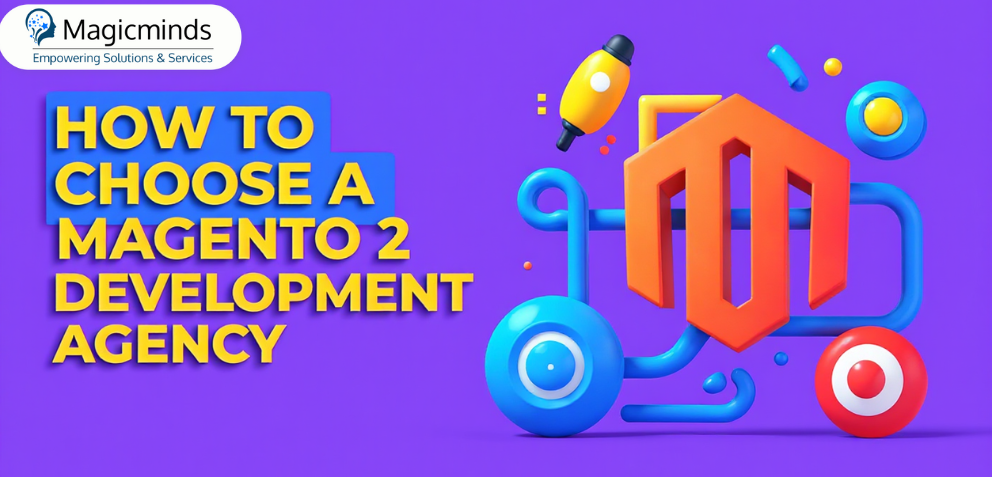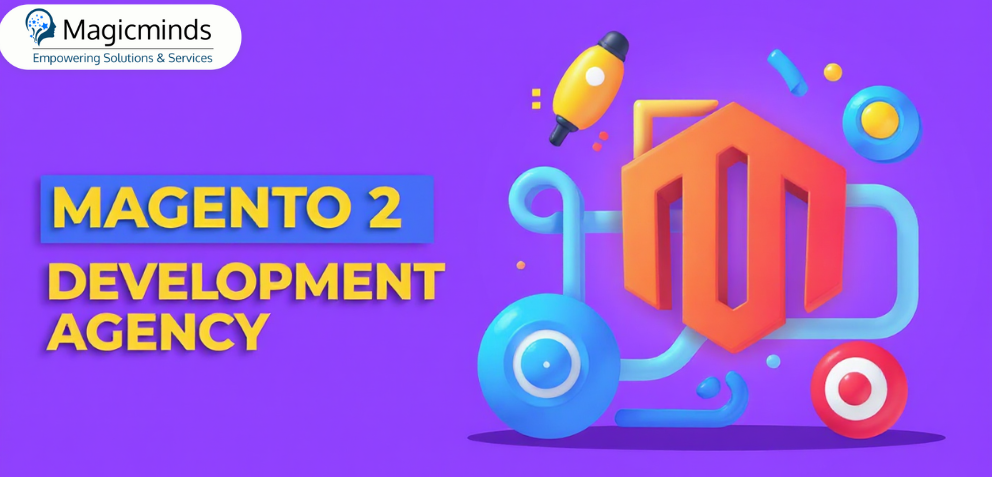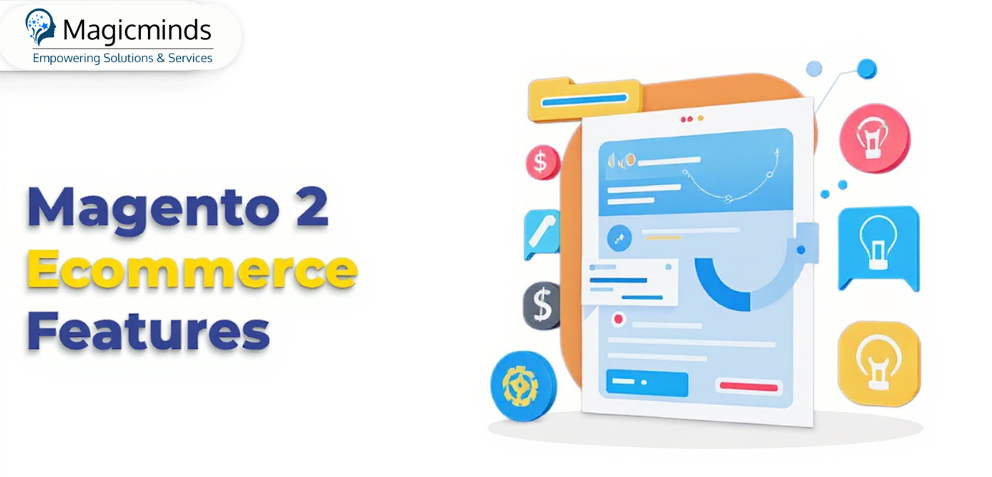Shopify vs. Magento: Understanding the Best eCommerce Platform
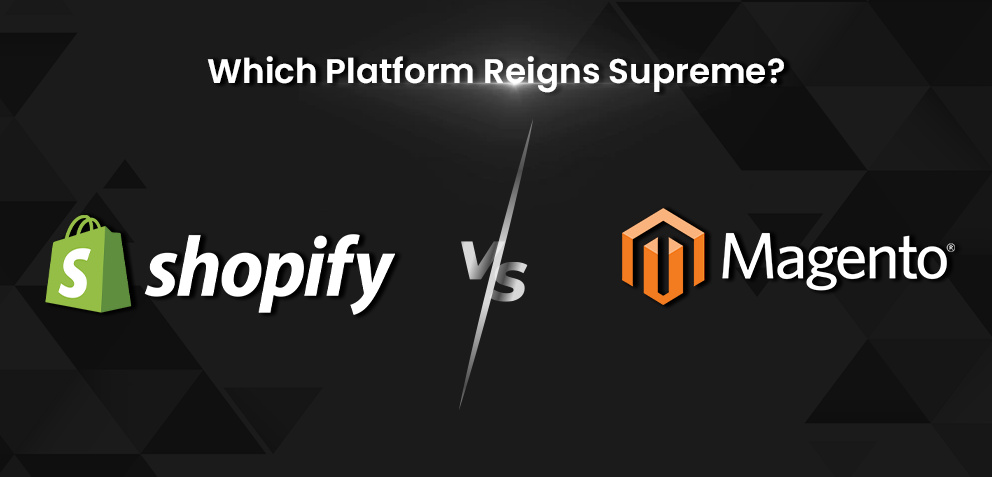
Table Of Contents
 Stay In-the-loop
Stay In-the-loop
Get fresh tech & marketing insights delivered right to your inbox.
Share this Article
Tags
Category
- .Net Developer
- Adtech
- Android App Development
- API
- App Store
- Artificial Intelligence
- Blockchain Development
- Chatbot Development
- CMS Development
- Cybersecurity
- Data Security
- Dedicated Developers
- Digital Marketing
- Ecommerce Development
- Edtech
- Fintech
- Flutter app development
- Full Stack Development
- Healthcare Tech
- Hybrid App Development
- iOS App Development
- IT Project Management
- JavaScript development
- Laravel Development
- Magento Development
- MEAN Stack Developer
- MERN Stack Developer
- Mobile App
- Mobile App Development
- Nodejs Development
- Progressive Web Application
- python development
- QA and testing
- Quality Engineering
- React Native
- SaaS
- SEO
- Shopify Development
- Software Development
- Software Outsourcing
- Staff Augmentation
- UI/UX Development
- Web analytics tools
- Wordpress Development
Selecting between Shopify and Magento can be challenging for marking your online store’s impeccable presence, boosting performance, and streamlining growth. However, not anymore! Our comprehensive study on Shopify vs. Magento is here to help. Our blog explores the differences between these two robust platforms based on different criteria. So, without further ado, let’s embark on the journey together!
A Comparative Analysis of Shopify vs Magento
Let’s take a quick glance at Shopify’s and Magento’s comparative charts
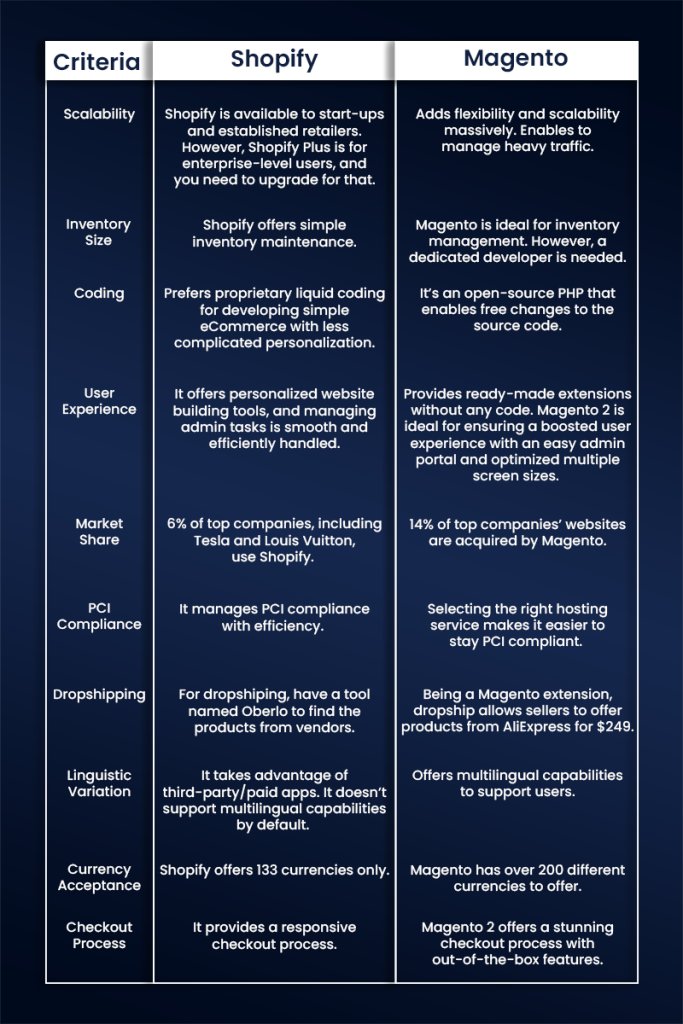
#1 Shopify: The Pros and Cons
Let’s have a look at the pros and cons of Shopify.

Screenshot Credit: Shopify
Advantages of Shopify
Shopify comes with extensive benefits. The advantages of Shopify are mentioned below:
- Shopify supports a robust backend editor and enhanced inventory system, making it perfect for maintaining and scaling the business.
- Shopify targets selling on different platforms, such as Facebook, Instagram, eBay, and Amazon
- It offers a modern, intuitive, user-friendly, no-code, responsive variety of themes. 12 are free, and the remaining 160 themes are paid, starting from above $140.
- Shopify offers a vast app library and third-party extensions, enhancing the store.
- It provides its own payment gateway, Shopify Payments, and more than 100 other payment options.
- Shopify ensures a 24*7 customer support system.
Disadvantages of Shopify
The disadvantages of Shopify are below-mentioned:
- Shopify does have some limitations. It offers fewer built-in features compared to platforms like Wix, which means you may need to install apps to enhance your store’s functionality. This can add to your costs, making Shopify a more expensive option.
- Unless you have Shopify Payments, a heavy transaction fee would add on other payment gateway costs, too.
- Be aware of installing third-party paid apps! This certainly adds extra costs.
- Shopify lacks personalization in comparison to Magento.
Top Website Example Built Using Shopify
Utilizing Shopify, top brands can unlock seamless user experience, easy-to-use functionalities, and user-friendly approach. So, why do brands prefer Shopify? Oh, by the way, to unlock these opportunities, you must hire shopify experts.
-
Louis Vuitton
A big name, Louis Vuitton Malletier, which offers lifestyle products alongside gifting and personalization services, trusts Shopify to build its online store. Shopify helps them navigate with a smooth user interface and a simple layout.

Screenshot Credit: Louis Vuitton
-
Tesla
If you’re a lover of cars and vehicle accessories, you must have heard the name of the American automotive and clean energy company Tesla. With Shopify, Tesla has built a simple, smooth navigation path.
-
Kylie Cosmetics
Popular social media icon Kylie Jenner has started this beauty products brand. Shopify helps this reputed brand alter the website’s appearance and layouts based on the cosmetic products and seasons promoted by Kylie.
-
Netflix
Now, who doesn’t know and love Netflix’s content? Netflix, being one of the finest entertainment platforms, serves diverse audiences across the globe. Netflix uses Shopify to build its website, well, not for TV shows and movie streaming but selling merchandise and lifestyle goods related to the popular Netflix shows.
-
Rebecca Minkoff
Rebecca Minkoff is a famous fashion brand that prefers advanced technologies to enhance their customers’ experience. How? Empowered by Shopify Plus, this brand introduces 3D and Augmented Reality (AR) technologies to communicate with users. The main motive is to make users ‘feel’ their signature handbags, just like a physical store experience for engagement.
-
Gymshark
This company comes under the list of top companies that rely on Shopify. This eCommerce platform ensures less theme navigation, making it super cool and smooth to complete the order for users.
-
Red Bull
Red Bull is a popular energy drink brand that prefers Shopify for clear and minimal navigation options, generating more meaningful connections and conversion rates.
#2 Magento: The Pros and Cons
Now, let’s have a sneak peek at the pros and cons of Magento.

Screenshot Credit: Adobe Experience Cloud
Advantages of Magento
Magento offers a plethora of benefits, and those are:
- Magento is empowered with advanced functionality that ensures personalized customer experiences, making it a better choice than other eCommerce platforms.
- It offers a flexible platform, enabling you to design it yourself. But you have to be aware of coding, that’s all!
- Magento is preferable for organization-owned web development teams and externally hired employees, catering to medium to large-size businesses.
- Leveraging a customized cart would impact the return on investment (ROI), along with finishing the order placement and searching for more services or cross-sold goods.
- Magento comes with a large, strong, learned, and dedicated community of users, catering support globally.
Disadvantages of Magento
The disadvantages of Magento are:
- Getting a hosting company that manages Magento is crucial and often not easier to find than open-source applications. However, you can contact SiteGround for Magento hosting services.
- Magento is designed so complexly that it is difficult for new developers to build an eCommerce store. They must have prior coding knowledge or the assistance of an experienced developer.
- Magento is expensive; although the Open Source is free to avail, the hosting price is costly, particularly for large businesses. Even self-hosting is expensive compared to an equivalent setup in Shopify.
- Installing Magento is critical as finding the right hosting company is difficult compared to other available open-source applications. However, SiteGround provides a better hosting service.
Top Website Example Built Using Magento
Magento is an advanced platform that offers faster loading times, effective navigation paths, and tailored shopping, not to mention the flexibility and mobile optimization alongside the seamless shopping experience it incorporates. So, who keeps faith in Magento service?
-
Sigma Beauty
Established in 2008, this famous beauty brand has set the bar really high in beauty products and makeup tools. The brand takes advantage of Magento because of its responsive design, simple navigation path, smooth integration with social media platforms, and customized product recommendations, enhancing the buying experience and catering to diverse beauties worldwide.
-
Ford
Ford, a popular automobile service, is a choice for a wide range of people. This company prefers Magento to build and optimize their website accurately. Using Magento, Ford enables users to get a 360° image view, a safe payment solution, smooth product filter options, and a mobile-responsive design.
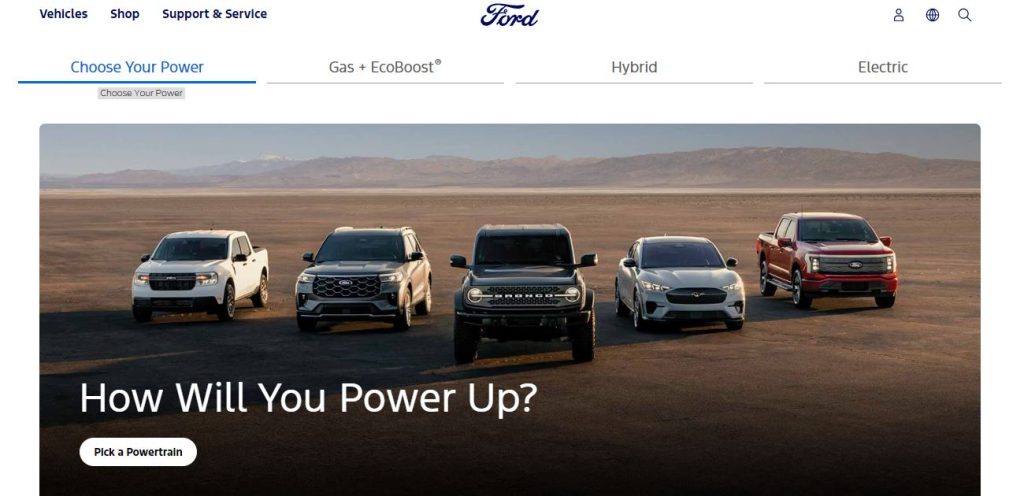
Screenshot Credit: Ford
-
Vizio
Vizio is a leading TV and audio infrastructure manufacturer. You probably already have a product from this company in your home. Being a Magento enterprise customer, this company uses Magento for its clear and user-oriented features, helping users with a seamless, hassle-free shopping experience.
-
Helly Hansen
Famous Norwegian sportswear brand Helly Hansen has offered top-notch quality products for over 138 years. They prefer the Magento platform for focusing on their vast collections. Magento helps them get optimized website performance and quicker loading speed, an easy checkout process, a mobile-friendly and intuitive design, and tailored promotions.

Screenshot Credit: Helly Hansen
-
Canon
Canon is the most preferred manufacturer of cameras, lenses, printers, and medical instruments. Canon opts for Magento’s smooth navigation, tailored shopping experience, seamless transaction process, and efficient checkout process.
-
Land Rover
Land Rover is another leading brand in the auto industry, providing a seamless browsing experience to diverse customers who love their merchandise. So, why does Land Rover use Magento? Of course, for the streamlined navigation, product searching, incorporation of the global dealer network, and safe payment process.
-
Jaguar
Does this brand even need any introduction? This luxurious athletic sports car and Sedan company prefer Magento for its intuitive and stunning design and efficient functionalities that attract customers’ attention while making it simpler for them to purchase their choice of product.

Screenshot Credit: Jaguar
Empower Your Online Stores with Magicminds’ eCommerce Solutions!
#3 Usability
When comparing Shopify with Magento, the former platform proves to be far easier and smoother. Why? Let’s investigate.
Shopify platform helps business owners build intuitive, engaging, and stunning eCommerce platforms seamlessly, making it a popular choice among them. This platform offers a one-stop-shop-destination alongside a drag-and-drop admin interface or website builder, enabling you to add new pages easily and modify them accordingly. What does it mean? Well, Shopify empowers you to rearrange the page items with a tailored experience.
On the other hand, Magento offers an exclusive extensions marketplace with vast integrated modifications and features that help Magento cater to enterprise-level clients effortlessly that Shopify can’t match. Besides, Magento offers adaptability and versatility that Shopify doesn’t provide. In fact, Magento can outperform Shopify if it gets proper time and effort investments.
To build Magento eCommerce, you must hire a magento developer or contact a Shopify development company to create a store in Shopify.
#4 Engaging Themes

Screenshot Credit: Kendra Scott
When customers visit a website, what grabs their attention first? Undoubtedly, it’s the theme of the eCommerce platform. As per 48% of website visitors, a website’s design is key in determining the business’ credibility. In fact, an eye-catching design can retain more customers than you ever think. Thereby, it’s a must that you select the right template to establish your brand image.
Shopify scores 3.7/5 in website theme development, ensuring 10 free and 64 premium templates, which is more cost-effective than Magento’s basic themes. User-intuitive, compelling, and stunning, Shopify themes are mobile responsive and look amazing on mobile, tablet, and computer.
You’ll go nuts with Shopify’s personalization features, like adding new pages, changing color scheme change, reshaping or rearranging items, combining social network feeds, etc., without writing a single code. Isn’t that cool? Yes, we also think so.
Similarly, Magento receives 3.5/5 in the website design part, which provides ready-made themes, eliminating the need for code customization and focusing on the expertise of the dedicated Magento developer. However, a ready-made theme comes costly, pricing $100 for average and $600-$25000 for unique ones.
As a result, only huge revenue businesses can afford Magento eCommerce, whereas Shopify’s themes are easy to adapt and build the online store smoothly.
#5 Advanced Sales Tools
From a sales criteria, Shopify scores an awesome 4.7/5, enabling businesses to earn increased revenue. So, let’s take a quick look at the best features. Shopify-
- Recover visitors who abandoned the website before completing the order via sending automated emails to remind them and regain potentially lost customers.
- Has an in-built capability for selling goods on multiple platforms, such as Facebook, Instagram, Amazon, and Pinterest.
- Offers digital products alongside the physical ones.
- Has partnered with USPS, DHL Express, UPS, and Canada Post, eliminating your hassle of searching the courier service.
At the same time, Magento gets 4 out of 5 from a sales perspective, offering an amazing inventory management system that comes with exclusive features, like huge product imports from the database, multiple product versions, revenue statistics, and totally counted visitors. Magento sales tools ensure-
- Extensions installation for connecting the store with Facebook, eBay, and Instagram due to several channel selling potentiality
- Tailored checkout process with a touch of personalization.
- Recovery of the left-out cart.
- Stable price and percentage discounts.
Additionally, Shopify offers more exclusive sales tools than Magento, and Shopify comes with in-built multichannel selling features, whereas in Magento, you need to buy those extensions, which is expensive.
RELATED READ: How to Integrate SEO to Empower eCommerce Success?
#6 Seamless Marketing Features
Embracing the power of robust marketing tools aids businesses in establishing their brand image and improving revenue while staying ahead of their competitors. Who doesn’t love it, right?
Shopify has impressive marketing tools to run email campaigns effortlessly with external or third-party integrations, such as Klaviyo, Constant Contact, Segundo, etc. As previously mentioned, Shopify offers direct sales on Instagram, Facebook, and more platforms while advertising them correctly. Besides, Shopify is empowered with multilingual sites, assisting diverse businesses in selling goods in multiple languages. Shopify’s email marketing templates even feature known holidays.
On the other hand, Magento depends on its marketplace for marketing tools. For example, to run email campaigns, businesses must install extensions like Remarkety. Besides, for personalized features, businesses should contact a Magento development company or hire a dedicated Magento developer.
#7 Applications and Add-Ons
Both Shopify and Magento support smooth installation of applications, extensions, and add-ons. However, which platform is more suitable?
Shopify’s app development and App Store consists of more than 1200 free and premium applications for business requirements, such as social media advertising, email marketing, shipping, etc. Have a glimpse over our preferred apps available on the Shopify App Market –
- Analytics Buddy: Helps to pull Google Analytics data into the Shopify dashboard, ensuring powerful and useful insights.
- Trust Hero: Do you know payment security issues lead to 15% cart abandonment? It represents digital security badges to motivate users to complete the purchase.
- Trackr: Having this application means your clients will automatically get an order update at just a $4/month cost.
- MailChimp: Incorporates email marketing campaigns with the Shopify store to increase sales.
On the other hand, Magento Marketplace offers more than 5000 extensions; out of that, only 1970 are free. While several extensions cost up to $2000, 10% of the paid versions can cost you $30. Take, for example, while Shopify offers free integration with Facebook, for Magento, you must pay $199 to incorporate the online store with Facebook. We adore the Magento apps below:
- Remarkety: It incorporates email marketing campaigns with social media feeds and the eCommerce platform.
- Amasty Multiple Coupons: This app facilitates this by adding customized discounted coupons alongside other coupons, encouraging purchases, and making customers feel valued.
- Banner Slider: This app supports implementing advertising banners with tailored links and helps you create an ideal source of increasing revenues.
- Product Pre-Order: This app takes up all your headaches by sending automatic emails when a new product is available at your store and evaluating the market value and demand of that product among your customers.
Furthermore, Shopify offers a simple yet vast App Market with well-defined and high-quality apps, whereas Magento ensures extensive and exclusive extensions; however, installing them is challenging, demanding the assistance of experienced developers. For that, you can get help from Magento eCommerce development services.
#8 Payment Process and Transaction Fees
Usually, payment processing refers to the acceptance of online payment on any website or eCommerce platform. We’re glad to see that both Magento and Shopify are empowered with this.
Shopify offers its own payment processor solution, named Shopify Payments, that takes 0 transaction fees apart from the regular credit card transaction fees. Check the table below for more detailed information.

Additionally, Shopify offers 100+ different payment gateways, including PayPal, Apple Pay, Amazon Pay, Stripe, and more, which charge transaction fees.
Magento, on the other hand, supports 150+ payment gateways, which is particularly good for large businesses. You must install payment processors such as Stripe or Square from the marketplace to integrate the eCommerce store with them. In addition to using your own inventory, Magento enables you to sell products on the Amazon marketplace for a wider reach.
ALSO READ: Magento Multi Store Setup Step-by-Step Guide 2024
#9 Price
As mentioned, Shopify is a hosted medium that deals with all the hosting concerns and provides comfort. All the hosting-related expenses come under the monthly subscription, eliminating you from paying any hidden costs. Shopify comes with three major price options.
Whereas Magento is a self-hosted service provider. This platform is a free source for downloading and installing. However, you must pay for security, extensions, and web hosting, such as SiteGround.
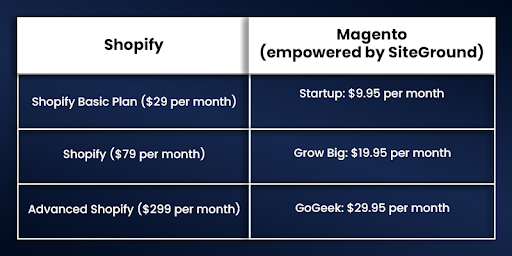
What’s more important is that Magento mainly serves enterprise-level businesses with an Enterprise plan whose budget is high. However, we would focus more on the ‘community’ edition part for this comparative analysis. Pay for the domain costs around $10, and $15 yearly for using Magento. Visit a domain registrar, such as Domain.com, to register the new domain.
Furthermore, if we have to decide the verdict about the price between these two powerful platforms, we would say we prefer both of them, and in our perspective, it’s tied as these two are completely different platforms, so the price range should be different. Isn’t it obvious?
Power Up Your eCommerce Experience with Magicminds Today!
Contact Us!#10 Support System
The more smoothly and quickly you fix your eCommerce platform’s issues, the faster you can get back and sell products while gaining more customers. Therefore, your selected platform’s support system should cover certain boxes. Fortunately, both Shopify and Magento offer vast help and support systems, assisting you to boost your sales and earn a conversion rate.
According to a report, Shopify scores 4.1 out of 5 in support criteria because of its –
- 24*7 phone support
- 24*7 live chat support
- Social media support
- Public forum
- Help desk assistance
- Exclusive professional help
- Guidance through videos
- Email support
On the other hand, Magento has extensive community support that ensures exclusive and advanced user manuals to build the online store from scratch. Those manuals contain step-wise guidance and important advice on creating a website by Magento professionals. Note that we love Magento’s excellent user guides alongside SiteGround’s great support system.
#11 Mobile Adaptivity
In this fast-paced technology landscape, mobile eCommerce sales are increasing predominantly. The mobile commerce platform was valued at $359.32 billion in 2021. According to the report, it’s likely to reach $728.28 billion by 2025. So, isn’t it a testimonial for businesses to focus more on mobile adaptive websites?
Fortunately, both Shopify and Magento have simple yet effective mobile-responsive templates, providing an efficient, easy-going, and slick user experience.
However, Magento has won our hearts in this category with its excellent and stunning mobile experience.
#12 Payment Gateways
Both Shopify and Magento offer multiple payment options, such as PayPal, Braintree, etc. However, in the payment gateway part, Magneto has won our hearts. Do you know why? Undoubtedly, it facilitates clients with 340 payment gateways, which is the prime reason. Handling payments of internal merchants is another amazing point of Magneto. Shopify, on the other hand, accepts more than 100 payment gateways. In case you’re not using its own payment gateway called Shopify Payments, you must pay 2%, 1%, and 0.5% additional transaction fees for the basic, medium, and advanced Shopify plans. Contact a Shopify store development service to handle payment gateways seamlessly.
#13 Boosted Performance
Magento aids with caching-oriented amplified solutions that can increase the website’s performance. Besides, Magento offers personalized shopping experiences such as cross-selling, up-selling, and innovative shopping cart experiences. When you run a website on an optimized hosting solution, that can do nothing but dramatically improve and speed up the page loading time. As a result, it directly impacts user experience alongside enhanced sales and revenue.
On the other hand, Shopify lacks faster page loading times, impacting website performance.
READ MORE: 16 Tips to Optimize Your Shopify Store’s Conversion Rate
#14 Enhanced SEO
Now, surely, we don’t need to remind you of the importance of search engine optimization (SEO) in improving website discoverability, right? Magento shines brightly in this criteria with its structured SEO guidelines and prompts that help you get started. Change the URLs and picture alt tags to assist search engine users in easily accessing your website.
On the other hand, Shopify, in the SEO department, can’t even compete with Magento. Although Shopify editor can modify picture alt tags and page names, it mostly relies on installing the applications for SEO purposes.
#15 Seamless Security
Needless to say, security is a prime concern for online store owners. SSL certificates are crucial as without them, non-compliance issues, lack of customer and search engine trust, cyber vulnerabilities, and attacks may arise. Shopify manages SSL certificate integration, whereas Magento compels you to purchase and install SSL certificates.
RELATED READ: Shopify vs. Shopify Plus: Which Is Right for Your Enterprise?
Shopify vs Magento: Which eCommerce is Best for Your Business?
We’ve shared with you the advantages and disadvantages of Shopify and Magento in terms of different important criteria. Selecting Shopify vs Magento can be a tough decision for you while building your online store. However, don’t be disheartened.
To select any platform for your eCommerce store, first understand your business requirements and what kind of store you want, your customers, and your functionalities. Based on these you can decide as per your needs. For that, you must pay a dedicated Shopify developer or connect with a Magento development service. They will help you to build the website of your choice.
Build Your Dream eCommerce Platform with Magicminds!!
To conclude, Shopify and Magento both offer exclusive and advanced features to help you establish your online store. Shopify offers more user-friendly features than Magento, whereas Magento is good at handling medium to enterprise-level businesses. Now, these two platforms have their own pros and cons.
However, according to your eCommerce store, you must choose the platform that suits you the best and mark your presence in the digital landscape. However, if you’re confused about where to start, you can reach out to us. Our dedicated developers will empower you to build your dream online stores and boost your online visibility. So, why are you hesitating? Connect with us now and witness your dream turn into reality!!!!
Selecting between Shopify and Magento can be challenging for marking your online store’s impeccable presence, boosting performance, and streamlining growth. However, not anymore! Our comprehensive study on Shopify vs. Magento is here to help. Our blog explores the differences between these two robust platforms based on different criteria. So, without further ado, let’s embark on the journey together!
| Table of Content
A Comparative Analysis of Shopify vs Magento #1 Shopify: The Pros and Cons #2 Magento: The Pros and Cons #3 Usability #4 Engaging Themes #5 Advanced Sales Tools #6 Seamless Marketing Features #7 Applications and Add-Ons #8 Payment Process and Transaction Fees #9 Price #10 Support System #11 Mobile Adaptivity #12 Payment Gateways #13 Boosted Performance #14 Enhanced SEO #15 Seamless Security
Shopify vs Magento: Which eCommerce is Best for Your Business? Build Your Dream eCommerce Platform with Magicminds!! |
A Comparative Analysis of Shopify vs Magento
Let’s take a quick glance at Shopify’s and Magento’s comparative charts.
| Criteria | Shopify | Magento |
|---|---|---|
| Scalability | Shopify is available to start-ups and established retailers. However, Shopify Plus is for enterprise-level users, and you need to upgrade for that. | Adds flexibility and scalability massively. Enables to manage heavy traffic. |
| Support | It offers high-quality customer service. | Magento excels in the department with its unmatched community support and customer support services. |
| Inventory Size | Shopify offers simple inventory maintenance. | Magento is ideal for inventory management. However, a dedicated developer is needed. |
| Coding | Prefers proprietary liquid coding for developing simple eCommerce with less complicated personalization. | It’s an open-source PHP that enables free changes to the source code. |
| User Experience | It offers personalized website building tools, and managing admin tasks is smooth and efficiently handled. | Provides ready-made extensions without any code. Magento 2 is ideal for ensuring a boosted user experience with an easy admin portal and optimized multiple screen sizes. |
| Market Share | 6% of top companies, including Tesla and Louis Vuitton, use Shopify. | 14% of top companies’ websites are acquired by Magento. |
| Updates | Shopify handles upgrades and patches for its clients. | Users must manually apply for upgrades and patches. |
| PCI Compliance | It manages PCI compliance with efficiency. | Selecting the right hosting service makes it easier to stay PCI compliant. |
| Dropshipping | For dropshiping, have a tool named Oberlo to find the products from vendors. | Being a Magento extension, dropship allows sellers to offer products from AliExpress for $249. |
| Coupons Availability | Apart from the Lite plan, this platform offers coupons for every plan. | Enables creation and calculation of discount codes. |
| Linguistic Variation | It takes advantage of third-party/paid apps. It doesn’t support multilingual capabilities by default. | Offers multilingual capabilities to support users. |
| Currency Acceptance | Shopify offers 133 currencies only. | Magento has over 200 different currencies to offer. |
| Checkout Process | It provides a responsive checkout process. | Magento 2 offers a stunning checkout process with out-of-the-box features. |
#1 Shopify: The Pros and Cons
Let’s have a look at the pros and cons of Shopify.
Screenshot Credit: Shopify
Advantages of Shopify
Shopify comes with extensive benefits. The advantages of Shopify are mentioned below:
- Shopify supports a robust backend editor and enhanced inventory system, making it perfect for maintaining and scaling the business.
- Shopify targets selling on different platforms, such as Facebook, Instagram, eBay, and Amazon
- It offers a modern, intuitive, user-friendly, no-code, responsive variety of themes. 12 are free, and the remaining 160 themes are paid, starting from above $140.
- Shopify offers a vast app library and third-party extensions, enhancing the store.
- It provides its own payment gateway, Shopify Payments, and more than 100 other payment options.
- Shopify ensures a 24*7 customer support system.
Disadvantages of Shopify
The disadvantages of Shopify are below-mentioned:
- Shopify does have some limitations. It offers fewer built-in features compared to platforms like Wix, which means you may need to install apps to enhance your store’s functionality. This can add to your costs, making Shopify a more expensive option.
- Unless you have Shopify Payments, a heavy transaction fee would add on other payment gateway costs, too.
- Be aware of installing third-party paid apps! This certainly adds extra costs.
- Shopify lacks personalization in comparison to Magento.
Top Website Example Built Using Shopify
Utilizing Shopify, top brands can unlock seamless user experience, easy-to-use functionalities, and user-friendly approach. So, why do brands prefer Shopify? Oh, by the way, to unlock these opportunities, you must hire Shopify experts.
-
Louis Vuitton
A big name, Louis Vuitton Malletier, which offers lifestyle products alongside gifting and personalization services, trusts Shopify to build its online store. Shopify helps them navigate with a smooth user interface and a simple layout.
Screenshot Credit: Louis Vuitton
-
Tesla
If you’re a lover of cars and vehicle accessories, you must have heard the name of the American automotive and clean energy company Tesla. With Shopify, Tesla has built a simple, smooth navigation path.
-
Kylie Cosmetics
Popular social media icon Kylie Jenner has started this beauty products brand. Shopify helps this reputed brand alter the website’s appearance and layouts based on the cosmetic products and seasons promoted by Kylie.
-
Netflix
Now, who doesn’t know and love Netflix’s content? Netflix, being one of the finest entertainment platforms, serves diverse audiences across the globe. Netflix uses Shopify to build its website, well, not for TV shows and movie streaming but selling merchandise and lifestyle goods related to the popular Netflix shows.
-
Rebecca Minkoff
Rebecca Minkoff is a famous fashion brand that prefers advanced technologies to enhance their customers’ experience. How? Empowered by Shopify Plus, this brand introduces 3D and Augmented Reality (AR) technologies to communicate with users. The main motive is to make users ‘feel’ their signature handbags, just like a physical store experience for engagement.
-
Gymshark
This company comes under the list of top companies that rely on Shopify. This eCommerce platform ensures less theme navigation, making it super cool and smooth to complete the order for users.
-
Red Bull
Red Bull is a popular energy drink brand that prefers Shopify for clear and minimal navigation options, generating more meaningful connections and conversion rates.
#2 Magento: The Pros and Cons
Now, let’s have a sneak peek at the pros and cons of Magento.
Screenshot Credit: Adobe Experience Cloud
Advantages of Magento
Magento offers a plethora of benefits, and those are:
- Magento is empowered with advanced functionality that ensures personalized customer experiences, making it a better choice than other eCommerce platforms.
- It offers a flexible platform, enabling you to design it yourself. But you have to be aware of coding, that’s all!
- Magento is preferable for organization-owned web development teams and externally hired employees, catering to medium to large-size businesses.
- Leveraging a customized cart would impact the return on investment (ROI), along with finishing the order placement and searching for more services or cross-sold goods.
- Magento comes with a large, strong, learned, and dedicated community of users, catering support globally.
Disadvantages of Magento
The disadvantages of Magento are:
- Getting a hosting company that manages Magento is crucial and often not easier to find than open-source applications. However, you can contact SiteGround for Magento hosting services.
- Magento is designed so complexly that it is difficult for new developers to build an eCommerce store. They must have prior coding knowledge or the assistance of an experienced developer.
- Magento is expensive; although the Open Source is free to avail, the hosting price is costly, particularly for large businesses. Even self-hosting is expensive compared to an equivalent setup in Shopify.
- Installing Magento is critical as finding the right hosting company is difficult compared to other available open-source applications. However, SiteGround provides a better hosting service.
Top Website Example Built Using Magento
Magento is an advanced platform that offers faster loading times, effective navigation paths, and tailored shopping, not to mention the flexibility and mobile optimization alongside the seamless shopping experience it incorporates. So, who keeps faith in Magento service?
-
Sigma Beauty
Established in 2008, this famous beauty brand has set the bar really high in beauty products and makeup tools. The brand takes advantage of Magento because of its responsive design, simple navigation path, smooth integration with social media platforms, and customized product recommendations, enhancing the buying experience and catering to diverse beauties worldwide.
-
Ford
Ford, a popular automobile service, is a choice for a wide range of people. This company prefers Magento to build and optimize their website accurately. Using Magento, Ford enables users to get a 360° image view, a safe payment solution, smooth product filter options, and a mobile-responsive design.
Screenshot Credit: Ford
-
Vizio
Vizio is a leading TV and audio infrastructure manufacturer. You probably already have a product from this company in your home. Being a Magento enterprise customer, this company uses Magento for its clear and user-oriented features, helping users with a seamless, hassle-free shopping experience.
-
Helly Hansen
Famous Norwegian sportswear brand Helly Hansen has offered top-notch quality products for over 138 years. They prefer the Magento platform for focusing on their vast collections. Magento helps them get optimized website performance and quicker loading speed, an easy checkout process, a mobile-friendly and intuitive design, and tailored promotions.
Screenshot Credit: Helly Hansen
-
Canon
Canon is the most preferred manufacturer of cameras, lenses, printers, and medical instruments. Canon opts for Magento’s smooth navigation, tailored shopping experience, seamless transaction process, and efficient checkout process.
-
Land Rover
Land Rover is another leading brand in the auto industry, providing a seamless browsing experience to diverse customers who love their merchandise. So, why does Land Rover use Magento? Of course, for the streamlined navigation, product searching, incorporation of the global dealer network, and safe payment process.
-
Jaguar
Does this brand even need any introduction? This luxurious athletic sports car and Sedan company prefer Magento for its intuitive and stunning design and efficient functionalities that attract customers’ attention while making it simpler for them to purchase their choice of product.
Screenshot Credit: Jaguar
| Empower Your Online Stores with Magicminds’ eCommerce Solutions! Share Your Project Requirements |
#3 Usability
When comparing Shopify with Magento, the former platform proves to be far easier and smoother. Why? Let’s investigate.
Shopify platform helps business owners build intuitive, engaging, and stunning eCommerce platforms seamlessly, making it a popular choice among them. This platform offers a one-stop-shop-destination alongside a drag-and-drop admin interface or website builder, enabling you to add new pages easily and modify them accordingly. What does it mean? Well, Shopify empowers you to rearrange the page items with a tailored experience.
On the other hand, Magento offers an exclusive extensions marketplace with vast integrated modifications and features that help Magento cater to enterprise-level clients effortlessly that Shopify can’t match. Besides, Magento offers adaptability and versatility that Shopify doesn’t provide. In fact, Magento can outperform Shopify if it gets proper time and effort investments.
To build Magento eCommerce, you must hire a magento developer or contact a Shopify development company to create a store in Shopify.
#4 Engaging Themes
Screenshot Credit: Kendra Scott
When customers visit a website, what grabs their attention first? Undoubtedly, it’s the theme of the eCommerce platform. As per 48% of website visitors, a website’s design is key in determining the business’ credibility. In fact, an eye-catching design can retain more customers than you ever think. Thereby, it’s a must that you select the right template to establish your brand image.
Shopify scores 3.7/5 in website theme development, ensuring 10 free and 64 premium templates, which is more cost-effective than Magento’s basic themes. User-intuitive, compelling, and stunning, Shopify themes are mobile responsive and look amazing on mobile, tablet, and computer.
You’ll go nuts with Shopify’s personalization features, like adding new pages, changing color scheme change, reshaping or rearranging items, combining social network feeds, etc., without writing a single code. Isn’t that cool? Yes, we also think so.
Similarly, Magento receives 3.5/5 in the website design part, which provides ready-made themes, eliminating the need for code customization and focusing on the expertise of the dedicated Magento developer. However, a ready-made theme comes costly, pricing $100 for average and $600-$25000 for unique ones.
As a result, only huge revenue businesses can afford Magento eCommerce, whereas Shopify’s themes are easy to adapt and build the online store smoothly.
#5 Advanced Sales Tools
From a sales criteria, Shopify scores an awesome 4.7/5, enabling businesses to earn increased revenue. So, let’s take a quick look at the best features. Shopify-
- Recover visitors who abandoned the website before completing the order via sending automated emails to remind them and regain potentially lost customers.
- Has an in-built capability for selling goods on multiple platforms, such as Facebook, Instagram, Amazon, and Pinterest.
- Offers digital products alongside the physical ones.
- Has partnered with USPS, DHL Express, UPS, and Canada Post, eliminating your hassle of searching the courier service.
At the same time, Magento gets 4 out of 5 from a sales perspective, offering an amazing inventory management system that comes with exclusive features, like huge product imports from the database, multiple product versions, revenue statistics, and totally counted visitors. Magento sales tools ensure-
- Extensions installation for connecting the store with Facebook, eBay, and Instagram due to several channel selling potentiality
- Tailored checkout process with a touch of personalization.
- Recovery of the left-out cart.
- Stable price and percentage discounts.
Additionally, Shopify offers more exclusive sales tools than Magento and Shopify comes with in-built multichannel selling features, whereas, in Magento, you need to buy those extensions, which costs you huge.
RELATED READ: How to Integrate SEO to Empower eCommerce Success?
#6 Seamless Marketing Features
Embracing the power of robust marketing tools aids businesses in establishing their brand image and improving revenue while staying ahead of their competitors. Who doesn’t love it, right?
Shopify has impressive marketing tools to run email campaigns effortlessly with external or third-party integrations, such as Klaviyo, Constant Contact, Segundo, etc. As previously mentioned, Shopify offers direct sales on Instagram, Facebook, and more platforms while advertising them correctly. Besides, Shopify is empowered with multilingual sites, assisting diverse businesses in selling goods in multiple languages. Shopify’s email marketing templates even feature known holidays.
On the other hand, Magento depends on its marketplace for marketing tools. For example, to run email campaigns, businesses must install extensions like Remarkety. Besides, for personalized features, businesses should contact a Magento development company or hire a dedicated Magento developer.
#7 Applications and Add-Ons
Both Shopify and Magento support smooth installation of applications, extensions, and add-ons. However, which platform is more suitable?
Shopify’s app development and App Store consists of more than 1200 free and premium applications for business requirements, such as social media advertising, email marketing, shipping, etc. Have a glimpse over our preferred apps available on the Shopify App Market –
-
- Analytics Buddy: Helps to pull Google Analytics data into the Shopify dashboard, ensuring powerful and useful insights.
- Trust Hero: Do you know payment security issues lead to 15% cart abandonment? It represents digital security badges to motivate users to complete the purchase.
- Trackr: Having this application means your clients will automatically get an order update at just a $4/month cost.
- MailChimp: Incorporates email marketing campaigns with the Shopify store to increase sales.
On the other hand, Magento Marketplace offers more than 5000 extensions; out of that, only 1970 are free. While several extensions cost up to $2000, 10% of the paid versions can cost you $30. Take, for example, while Shopify offers free integration with Facebook, for Magento, you must pay $199 to incorporate the online store with Facebook. We adore the Magento apps below:
- Remarkety: It incorporates email marketing campaigns with social media feeds and the eCommerce platform.
- Amasty Multiple Coupons: This app facilitates this by adding customized discounted coupons alongside other coupons, encouraging purchases, and making customers feel valued.
- Banner Slider: This app supports implementing advertising banners with tailored links and helps you create an ideal source of increasing revenues.
- Product Pre-Order: This app takes up all your headaches by sending automatic emails when a new product is available at your store and evaluating the market value and demand of that product among your customers.
Furthermore, Shopify offers a simple yet vast App Market with well-defined and high-quality apps, whereas Magento ensures extensive and exclusive extensions; however, installing them is challenging, demanding the assistance of experienced developers. For that, you can get help from Magento eCommerce development services.
#8 Payment Process and Transaction Fees
Usually, payment processing refers to the acceptance of online payment on any website or eCommerce platform. We’re glad to see that both Magento and Shopify are empowered with this.
Shopify offers its own payment processor solution, named Shopify Payments, that takes 0 transaction fees apart from the regular credit card transaction fees. Check the table below for more detailed information.
| Shopify Basic Plan | Shopify Plan | Shopify Advanced |
| 2.9%+30 cent/transaction | 2.6%+30 cent/transaction | 2.4%+30 cent/transaction |
Additionally, Shopify offers 100+ different payment gateways, including PayPal, Apple Pay, Amazon Pay, Stripe, and more, which charge transaction fees.
Magento, on the other hand, supports 150+ payment gateways, which is particularly good for large businesses. You must install payment processors such as Stripe or Square from the marketplace to integrate the eCommerce store with them. In addition to using your own inventory, Magento enables you to sell products on the Amazon marketplace for a wider reach.
ALSO READ: Magento Multi Store Setup Step-by-Step Guide 2024
#9 Price
As mentioned, Shopify is a hosted medium that deals with all the hosting concerns and provides comfort. All the hosting-related expenses come under the monthly subscription, eliminating you from paying any hidden costs. Shopify comes with three major price options.
Whereas Magento is a self-hosted service provider. This platform is a free source for downloading and installing. However, you must pay for security, extensions, and web hosting, such as SiteGround.
| Shopify | Magento (empowered by SiteGround) |
| Shopify Basic Plan ($29 per month) | Startup: $9.95 per month |
| Shopify ($79 per month) | Grow Big: $19.95 per month |
| Advanced Shopify ($299 per month. | GoGeek: $29.95 per month |
What’s more important is that Magento mainly serves enterprise-level businesses with an Enterprise plan whose budget is high. However, we would focus more on the ‘community’ edition part for this comparative analysis. Pay for the domain costs around $10, and $15 yearly for using Magento. Visit a domain registrar, such as Domain.com, to register the new domain.
Furthermore, if we have to decide the verdict about the price between these two powerful platforms, we would say we prefer both of them, and in our perspective, it’s tied as these two are completely different platforms, so the price range should be different. Isn’t it obvious?
| Power Up Your eCommerce Experience with Magicminds Today! Connect With Us |
#10 Support System
The more smoothly and quickly you fix your eCommerce platform’s issues, the faster you can get back and sell products while gaining more customers. Therefore, your selected platform’s support system should cover certain boxes. Fortunately, both Shopify and Magento offer vast help and support systems, assisting you to boost your sales and earn a conversion rate.
According to a report, Shopify scores 4.1 out of 5 in support criteria because of its –
- 24*7 phone support
- 24*7 live chat support
- Social media support
- Public forum
- Help desk assistance
- Exclusive professional help
- Guidance through videos
- Email support
On the other hand, Magento has extensive community support that ensures exclusive and advanced user manuals to build the online store from scratch. Those manuals contain step-wise guidance and important advice on creating a website by Magento professionals. Note that we love Magento’s excellent user guides alongside SiteGround’s great support system.
#11 Mobile Adaptivity
In this fast-paced technology landscape, mobile eCommerce sales are increasing predominantly. The mobile commerce platform was valued at $359.32 billion in 2021. According to the report, it’s likely to reach $728.28 billion by 2025. So, isn’t it a testimonial for businesses to focus more on mobile adaptive websites?
Fortunately, both Shopify and Magento have simple yet effective mobile-responsive templates, providing an efficient, easy-going, and slick user experience.
However, Magento has won our hearts in this category with its excellent and stunning mobile experience.
#12 Payment Gateways
Both Shopify and Magento offer multiple payment options, such as PayPal, Braintree, etc. However, in the payment gateway part, Magneto has won our hearts. Do you know why? Undoubtedly, it facilitates clients with 340 payment gateways, which is the prime reason. Handling payments of internal merchants is another amazing point of Magneto. Shopify, on the other hand, accepts more than 100 payment gateways. In case you’re not using its own payment gateway called Shopify Payments, you must pay 2%, 1%, and 0.5% additional transaction fees for the basic, medium, and advanced Shopify plans. Contact a Shopify store development service to handle payment gateways seamlessly.
#13 Boosted Performance
Magento aids with caching-oriented amplified solutions that can increase the website’s performance. Besides, Magento offers personalized shopping experiences such as cross-selling, up-selling, and innovative shopping cart experiences. When you run a website on an optimized hosting solution, that can do nothing but dramatically improve and speed up the page loading time. As a result, it directly impacts user experience alongside enhanced sales and revenue.
On the other hand, Shopify lacks faster page loading times, impacting website performance.
READ MORE: 16 Tips to Optimize Your Shopify Store’s Conversion Rate
#14 Enhanced SEO
Now, surely, we don’t need to remind you of the importance of search engine optimization (SEO) in improving website discoverability, right? Magento shines brightly in this criteria with its structured SEO guidelines and prompts that help you get started. Change the URLs and picture alt tags to assist search engine users in easily accessing your website.
On the other hand, Shopify, in the SEO department, can’t even compete with Magento. Although Shopify editor can modify picture alt tags and page names, it mostly relies on installing the applications for SEO purposes.
| Trust Magicminds to Conquer the eCommerce World with Expert Solutions Hire Dedicated Developers |
#15 Seamless Security
Needless to say, security is a prime concern for online store owners. SSL certificates are crucial as without them, non-compliance issues, lack of customer and search engine trust, cyber vulnerabilities, and attacks may arise. Shopify manages SSL certificate integration, whereas Magento compels you to purchase and install SSL certificates.
RELATED READ: Shopify vs. Shopify Plus: Which Is Right for Your Enterprise?
Shopify vs Magento: Which eCommerce is Best for Your Business?
We’ve shared with you the advantages and disadvantages of Shopify and Magento in terms of different important criteria. Selecting Shopify vs Magento can be a tough decision for you while building your online store. However, don’t be disheartened.
To select any platform for your eCommerce store, first understand your business requirements and what kind of store you want, your customers, and your functionalities. Based on these you can decide as per your needs. For that, you must pay a dedicated Shopify developer or connect with a Magento development service. They will help you to build the website of your choice.
Build Your Dream eCommerce Platform with Magicminds!!
To conclude, Shopify and Magento both offer exclusive and advanced features to help you establish your online store. Shopify offers more user-friendly features than Magento, whereas Magento is good at handling medium to enterprise-level businesses. Now, these two platforms have their own pros and cons.
However, according to your eCommerce store, you must choose the platform that suits you the best and mark your presence in the digital landscape. However, if you’re confused about where to start, you can reach out to us. Our dedicated developers will empower you to build your dream online stores and boost your online visibility. So, why are you hesitating? Connect with us now and witness your dream turn into reality!!!!
